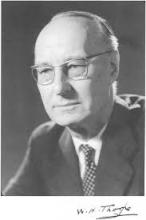William Homan Thorpe was born 1 April 1902 in Hastings. His father was an accountant actively involved in a local nonconformist church. Thorpe went to university late, entering Jesus College, Cambridge in 1921. He graduated in agriculture, and then took a PhD in entomology (awarded in 1929). After a few years working on parasites at a laboratory in Surrey, he returned to teach in Cambridge, again at Jesus College, and remained there for the rest of his career. He was elected Fellow of the Royal Society in 1951 and awarded a personal chair in 1966. He also variously served as president of the Association for the Study of Animal Behaviour and the British Entomological Society. In Cambridge, he founded the sub-department of animal behaviour and an ornithological field station. With Oliver Zangwill, Thorpe pioneered interdisciplinary approaches to questions of behaviour. The Thorpe-Zangwill club met in Thorpe’s rooms for about a decade from the time of Zangwill’s appointment in 1952, bringing together psychologists, anatomists, physiologists and zoologists.
He is remembered for two major academic contributions: together with Nikolaas Tinbergen in Oxford, he championed and established the place of ethology (i.e., the study of animal behaviour in their natural habitats) in the British academy; and he offered a series of classic studies that greatly advanced our understanding of the nature and role of birdsong. Most of his convictions and intuitions about ethology, and to some extent the subject itself, have more recently been found wanting, replaced by new approaches such as neuroscience or sociobiology.
Thorpe chose at various points to be public about his religious and moral struggles and convictions. He registered as a conscientious objector during the Second World War and joined the pacifist Society of Friends (the Quakers) as the war came to an end. His interest in ethology was motivated in part by a rejection of mechanistic and reductionistic accounts of science. Animal behaviour, he suggested, shaped evolution even as it was shaped by it. His writing increasingly turned to such questions, as evidenced by his works Biology and the Nature of Man (1962), Science, Men and Morals (1965), and the book that resulted from his Gifford lectures, Animal Nature and Human Nature (1974), among others.
Thorpe died 7 April 1986 in Cambridgeshire.



